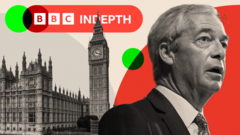The Reform party’s sustained presence at the top of national opinion polls for five consecutive months has ignited considerable debate among political analysts, particularly regarding the viability of their electoral strategy. The hypothesis gaining traction, as explored by figures such as Sir John Curtice, centers on the party’s potential to harness the significant bloc of voters who prioritised Brexit, and whether this consolidation could be sufficient to clinch an election victory.
This strategy posits that by exclusively appealing to and unifying the electorate segments most strongly aligned with the Brexit project, Reform could establish a foundational vote share capable of reshaping the political map. The argument is that this dedicated cohort, often feeling unrepresented by traditional parties, presents a substantial and potentially decisive electoral force if mobilised effectively under a single banner. This approach challenges conventional wisdom about needing broad, cross-spectrum appeal, instead focusing on maximising turnout and support within a specific, passionate segment.
The current polling data, showing a five-month lead, suggests a tangible shift in public sentiment and a significant protest vote against the established political order. This prolonged period of ascendancy indicates that Reform is not merely benefiting from a fleeting wave of dissatisfaction but might be tapping into deeper, more enduring currents within the electorate. Such a consistent performance in surveys is often seen as a robust indicator of growing influence and, potentially, a reordering of party allegiances.
However, the critical question remains whether this momentum can be sustained through a full general election campaign and translate into actual parliamentary seats. Opinion poll leads, while indicative of public mood, do not always directly correlate with electoral success, especially in a first-past-the-post system where geographical distribution of votes is paramount. The journey from leading in polls to winning an election demands more than just initial enthusiasm. It requires robust policy proposals beyond a core issue, a credible leadership team capable of withstanding intense scrutiny, and the ability to convert widespread disaffection into a clear mandate for governance. The coming months will be crucial in determining if the Reform party can solidify its support, broaden its appeal, and navigate the complexities of a national campaign to truly capture the electoral prize based on its distinctive strategy.



